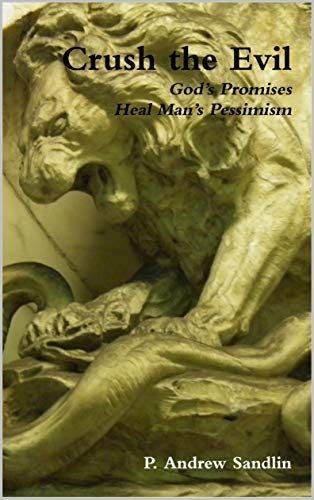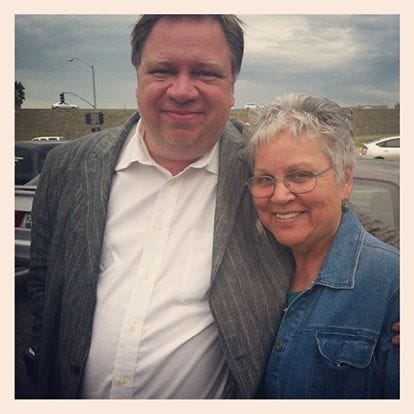Pessimism Is Not a Strategy
Pessimism poisons the kingdom of God for the individual, church, and culture. Christian hope demolishes pessimism.

Dear friends and supporters:
“Hope is not a strategy” — this is an increasingly popular adage. It means that we can be hopeful all we want, but unless we have a plan and strategy in place to accomplish what we’re hoping for, that hope will likely be dashed.
This adage is a gleaming example of commonsensical, contra-biblical, worldly wisdom. According to the Bible, hope is in fact a strategy, one of the greatest strategies of all. In 1 Corinthians 13, the apostle Paul defines it as one of the three guiding virtues of the Christian life.
A hope-filled book
The Bible, in fact, is a hope-filled book. In Romans 4:18 Paul holds up Abraham as an example of faith that elicited great reward, a man who “against who believed in hope.”
In Romans 15:4 he states that one of the prime reasons the Old Testament was written is that we would receive God’s glorious promises after trusting him in patient hope.
We are, moreover, saved by hope (Rom. 8:24). That is, hope parallels faith as an instrument in appropriating the free gift of salvation. No hope, no salvation.
As a final example among many scores that could be enumerated, the writer of Hebrews speaks of Jesus Christ as our crowning high priest, whose final, enduring sacrifice inspires in us impregnable hope:
[W]e ... have strong consolation, who have fled for refuge to lay hold of the hope set before us. This hope we have as an anchor of the soul, both sure and steadfast.... (Heb. 6:18b–19a).
Hope is no substitute for obedience
Of course, it’s true that hope isn’t a substitute for godly obedience. We may not refuse to plan wisely and then simply repose in our lazy hope.
But this doesn’t imply that hope isn’t a strategy. Indeed, were there no hope, there would be no reason for godly obedience at all. Our hope is in the Triune God, and because we trust in him, we obey him.
The denotation of “hope” in English has eroded over time. Today we might say, for example, “I hope I’ll get a pay raise soon.” This means that I don’t have any special confidence that it will happen, but I do desire it.
By contrast, biblical words for hope denote a confident expectation. Though we do not yet see what we desire (Rom. 8:24–25), we’re fully expectant and confident that our desire, based in God’s unfailing promises, will be fulfilled.
Christianity by its very nature can exist because of hope. We see evidence for God everywhere, but we do not see God. Our life is based on biblical promises and creational revelation. We don’t see much of what we know to be true. Our hope, that is, our confident expectation, is in taking God at his word.
If our hope is lost, we simply cannot be Christians.
Pervasive pessimism
The antonym of hope is hopelessness, an increasing vice in our dark, nihilistic world. The more pervasive problem, however, is an exit on the dispositional freeway toward hopelessness, and that is pessimism. Pessimism is the seed of hopelessness.
It’s also a vice that afflicts not just unbelievers, who objectively have no hope (Eph. 2:12), but too many Christians, who of all people should live in hope and not in pessimism. In fact, to live in pessimism is to live a contra-Christian life.
For the godly, hope is a strategy.
Pessimism is not a strategy. It crushes the life from Christians and renders us useless for the kingdom of God. Three particular arenas of pessimistic counter-strategy are: one’s individual life, the church, the wider culture.
This pessimism poisons the kingdom of God wherever it injects itself.
Pessimism is not a strategy for the Christian
Pessimism by Christians can color the wide spectrum of life, but it’s typically rooted in their experience of Christianity in their own lives. They believe the gospel can confer eternal life leading to heaven, plant them in Christ’s church, and comfort them in life’s tribulations and hardships. They generally aren’t convinced, however, that the gospel can re-orient their entire being — that they can live in consistent victory, faith, joy, and power. The Bible is clear that righteous success is the norm of Christian living (1 Cor. 15:58–59), but many Christians are much less hopeful, and therefore are mired in pessimism.
They know that Paul tells us that if we are in Christ, we are a new creation, all things having passed away, the new having arrived (2 Cor. 5:17).
They know that we have overcome the world because the one who resides in us, the Holy Spirit, is greater than the world’s prince, Satan (1 Jn. 4:4).
They know that we are presently reigning with Christ on his heavenly throne, in that we are united to him bone of bone, and flesh of flesh (Eph. 1:20–23, 2:1–6, 5:30).
But these texts and scores resembling them seem ethereal, unrealistic, and unattainable to many Christians. They therefore live in pessimism, assuming they’re destined to live shackled by the sins of the flesh, groping in spiritual ambivalence and haunted by pessimism. They sadly assume they’ll just have to live with hatred and lust and pride and timidity and irresponsibility and laziness (for example) until they die.
The dramatic transformation the Bible identifies with the new birth is not one they can wrap their mind around. But for Paul, if we have trusted Christ, we’re united (1) to his death, which paid sin’s penalty, and (2) to his resurrection, which defused sin’s power (Rom. 6:1–18). Union with the crucified and risen Lord changes everything. Because Christ’s death and resurrection crushed sin, if we are united to him, this victorious sin-crushing is our Christian birthright.
How do we gain this birthright? By faith:
Likewise you also, reckon [count or consider] yourselves to be dead indeed to sin, but alive to God in Christ Jesus our Lord. (Rom. 6:11)
Just as we are justified (declared judicially righteous) by faith, so we are victorious, hopeful, and optimistic by faith. When by faith we yield our entire being to the risen and reigning Lord, we walk in consistent victory (Rom. 6:13–16).
No “sinless perfection”
The Bible does not teach what some term “sinless perfection.” We’ve all sinned, even the most devoted of us (Rom. 3:23; Jn. 1:8–9), and in this present pre-consummation life, we cannot obtain a fully perfected status.
But we can, and should, live in a consistent victory over sin, Satan, the world, the flesh, and the devil.
Under-realized soteriologies
Too many pessimists embrace “Under-Realized Soteriologies”: we can’t expect to enjoy most of most benefits of salvation until the eternal state. The best we can hope for is to lope or meander along in the present life, constantly pining for the afterlife as a means to escape our present pessimistic spiritual mediocrity.
This is flatly false — and dangerous — teaching. It’s true that we can’t enjoy all of those soteric benefits, but we can enjoy many, even most.
The individualist pessimist points to Roman 7, in which Paul cries out in agony over the conflict between the flesh and the Spirit, that is, between the principle of indwelling sin, and the principle of indwelling righteousness.
The meaning of this chapter is perhaps the most hotly disputed in Christian history, but it furnishes no warrant for pessimism. Paul is obviously not referring to his pre-conversion life, which he never elsewhere depicts as a constant struggle between sinful and righteous desires.
But neither can he be referring to normative Christian living, every day constituting a fierce struggle between virtue and sin, during which righteousness wins about half the time and loses about half the time. That prospect flatly contradicts Paul’s description in Roman 6, as well as the victorious statements in Romans 8.
Rather, the much-quoted anguished cry of Romans 7:24 . . .
O wretched man that I am! Who will deliver me from this body of death?
... is what we suffer when we refuse to act in faith on the truth of Romans 6:11, cited above:
Likewise you also, reckon yourselves to be dead indeed to sin, but alive to God in Christ Jesus our Lord.
Romans 7, therefore, is a description of non-normative Christian living among those who refuse to take God at his word, who neglect to yield themselves to him in toto, and who therefore live in pessimistic unbelief.
As we claim God’s promises that we are delivered from the power of sin, and yield ourselves daily to the power of righteousness, that is, the Holy Spirit residing within us, we live in persistent victory over sin and the powers of darkness.
This means that there’s no mediocre ethical equilibrium in the Christian life. Normative Christianity is victorious, hopeful, optimistic Christianity. This is what it means to be united to the living Lord.
Exhortation to optimism
If you’re reading these lines and living in pessimism, take heart and hope: it’s a Satanic lie that you were destined to continue in torturous addictions, with an undisciplined tongue, an uncontrolled temper, burdensome pride or envy, and any other sin, inspiring a general spiritual malaise.
Satan has a vested interest in deceiving Christians into just such a pessimistic outlook. Claim the promises of the word of God by faith, and walk boldly every day, in spite of the circumstances. Yield yourself daily, and moment by moment, to the Holy Spirit, who confers nothing short of persistent victory in this life.
Pessimism is Not a Strategy for the Church
Pessimism among individual Christians naturally finds its way into the church (the ekklesia, or assembly): Christians don’t hold out much hope for the church’s success in its divine calling. Their vision is depressing. God is calling his elect (a distinct minority) from the four corners of the earth, bringing them into the church, and there will be fewer and fewer of them as history elapses. The church will grow increasingly weaker, and Satan and the state will grow increasingly stronger. The church can expect increased persecution and dwindling influence. The most for which we can hope is to hold out to the end — the comparative handful of us still left, that is.
This pessimism is pure poppycock. Peter interpreted the massive number of conversions at the first post-resurrection Pentecost (Ac. 15:12–17) as a fulfillment of the Old Testament prophecies of gospel victory among Jehovah’s corporate body. This wasn’t the historic high point for the church, only its auspicious beginning. Later, the apostles argued (Ac. 15:13–18) that in expanding the gospel to the Gentiles, God is fulfilling the promise to rebuild David’s tent, or house. This refers to the present reign of Messiah as he multiplies his church and exalts her in the world.
The Pentecostal event was the formal, public inauguration of the Lord‘s ever-growing assembly, on whom the heavenly King showered the gifts of the Spirit for ever-increasing earthly victory.
The apostle Paul assures the Ephesian church that they are the means by which God is ruling the earth (Eph. 1:15–23), and he guarantees the church of Rome that he will soon crush Satan under their feet (Rom. 16:20). This specifically refers to the protevangelium, the first gospel promise to Eve (Gen. 3:15) that her seed (Christ and all united to him by faith) would crush the head of the seed of the serpent (Satan and all united to him unbelief).
The ekklesia and the gates of death
But the biblical teaching that poses the greatest embarrassment to the ecclesiastical pessimists is Jesus’ initial mention of the church in Matthew 16:18 in his pledge to Peter:
And I also say to you that you are Peter, and on this rock I will build My church, and the gates of Hades shall not prevail against it.
It is a “puzzling” metaphor, according to Leon Morris. What was Jesus trying to say? He declares he’s laying the foundation for his new covenant people, and he implicitly depicts this church he is building as on the attack against the gates of Hades (the place of the departed dead).
Gates, of course, are stationary, and therefore have no role in offense warfare. The odd metaphor conveys that when the church storms Hades’ gates, the latter will be unable to hold out against the holy attack.
The failure of the gates
In the ancient world, including in the Bible, gates symbolically represent authority and power. Large cities were protected by thick, tall, massive walls, and the city’s ingress and egress were limited to the gates. Those gates, imposing and frequently inlaid with gold and other precious metals, were designed to project strength and intimidation.
When Jesus promises that the gates of Hades, or death, will not prevail when the church unleashes its attack, he is declaring that the most imposing weapon in the Satanic arsenal will be trampled by the church.
Death is the final enemy that Christ’s redemptive work will destroy (1 Cor. 15:26). God imposed life-ending punishment for sin in the Garden of Eden, and Satan has forever exploited that contra-creational but plaguing, unavoidable consequence. Satan is, as it were, the gatekeeper of Hades. Death is the silver bullet in his weapon.
But death’s days are numbered, and Christ’s church’s assault on its gates will not be repelled.
The church will not fail
The church’s unique tasks are to preserve Christian orthodoxy, to monopolize the sacraments or ordinances, and to maintain godly discipline over its members. The church is not the kingdom, but it is an indispensable part of that kingdom.
God enlarges his kingdom through gospel preaching, and in this way he increases the church’s earthly, cultural power. This means he increases the pervasiveness of orthodoxy, the power of the sacraments or ordinances to signify and seal his redemptive work, and to discipline his people to fulfill their primal calling, the cultural mandate. We are God’s deputies, caretakers of this world, and the church trains us for that world-conquering task.
Although individual churches can fail and die, the church as a divine institution can never die but is destined for incremental expansion.
The church in the West is growing anemic, effete, and cowardly, but churches in Africa, China, and South America have picked up the torch that fell (or was tossed) from the hands of Western Christianity, and are marching forward in great boldness and faith.
Moreover, history’s verdict will favor the church. Benjamin Warfield’s “Are They Few That Be Saved?” shows that in eternity, many more will have been saved than end up in the Christless eternity of hell. The gospel will overwhelm humanity.
The church is a winning institution, and to stand in and with the church is to align oneself with Christ’s burgeoning kingdom victory in history.
Pessimism is Not a Strategy for the Culture
Even Christians that can manage to avoid pessimism about their individual lives and the church draw the line at culture. The family and church can and should be redeemed, but there’s no hope that the culture will be redeemed. Not until Christ’s second coming can we be optimistic about Christian success in culture. Oppressive Covid-19 political edicts, the “wokeness” revolution, cancel culture, toppling of monuments, and an alleged imminent Biden Administration are only the latest evidence that evil is poised to capture culture once for all. Our only hope is a near or distant second advent. Christianity in culture will fail, and it was destined to fail all along.
This sentiment, though widespread, is nothing more than pious unbelief.
In 1 Corinthians 15:23–28, Paul lays out the sequence of redemptive history:
But each one in his own order: Christ the firstfruits, afterward those who are Christ’s at His coming. Then comes the end, when He delivers the kingdom to God the Father, when He puts an end to all rule and all authority and power. For He must reign [now] till He has put all enemies under His feet. The last enemy that will be destroyed is death. For “He has [present tense] put all things under His feet.” But when He says “all things are put under Him,” it is evident that He who put all things under Him is excepted. Now when all things are made subject to Him, then the Son Himself will also be subject to Him who put all things under Him, that God may be all in all.
As history unfolds, Christ’s kingdom will incrementally trample all enemies — including in culture, not just among individuals and in the church — except death, which will be destroyed only at the final resurrection, after the Lord’s kingdom has advanced to its pre-consummate fullness.
The Old Testament is pregnant with prophecies of this kingdom expansion within history; their fulfillment cannot be catapulted off into the eternal state, since it will still include death (Is. 65:20). Death will still occur, though lifespans will increase, domestic peace will prevail (Is. 65:25), and God’s law will reign supreme (Is. 2:3). These global blessings will occur before the consummate state.
This optimistic outlook refutes those Christians highly optimistic about their pessimism. They seem secretly to relish the (temporary) growth of abortion, same-sex “marriage,” socialism, pornography, and other cultural evils because these verify the imminent “rapture.” Therefore, no one must be permitted to cheat them out of their pessimism.
They live handwringing lives riveted to TV, computer, and iPhone screens that splay the 24/7 mainstream media breaking bad news. There’s never any cultural optimism they cannot find some cold water to throw on. They think they are taking sin with upmost seriousness, but they’re actually are taking Christ’s redemptive work and present gracious reign with almost no seriousness (Rom. 5:20).
They’re living in rank unbelief, which is especially irksome, not only becuause it fosters pessimism, but also because it discourages obedience to the Bible’s world-conquering kingdom responsibilities. They don’t work and pray for great cultural reformation, for the overturning of abortion and same-sex “marriage” and economic tyranny. They don’t encourage young Christians to prepare for lives in prominent vocations like science and technology and Fortune 500 executive leadership and politics and law and entertainment, since Christian application in these fields is doomed to failure anyway.
They are passive in the face of evil, and do not grasp the truth of “Resistance Theology Versus Resignation Theology.” They resign themselves to evil. Satan controls the present evil culture, and he controls it by entitlement. Not until Jesus Christ returns can our Lord rightfully claim this present world.
This is profanation of the highest order, despite its apparent piety, and an utter denial of the Lordship of Jesus Christ.
(continued below)
Shows that due to the promises of the Bible in Jesus Christ's death and resurrection, Christians must not be pessimistic about either individual or cultural evil, which God is progressively crushing.

Order the ebook here.
Conclusion
Alternatively, Christians stake their claim on the promises of God’s word, that the redemptive kingdom of his Son will impact every area of life and thought, including all of culture, and that we are soldiers and indomitable warriors, marching forward boldly in hope, faith, and optimism.
Pessimism is not a strategy. hope it’s a strategy, and it is a strategy that millions Christian in the present world need to adopt — and adopt soon.
Personal
This past week was personally eventful: Sharon and I celebrated our 38th wedding anniversary, my family observed the third anniversary my Mother’s death, and I celebrated my 58th birthday.




COVID-19 has been tragically fatal in many thousands of lives, and the draconian political edicts meant to impede it have wreaked havoc in our culture. In addition, the riots and monument toppling in the wake of the George Floyd killing have unleashed crime and chaos. “Wokeness,” Black Lives Matter, Critical Race Theory, and Cultural Marxism are undermining our free society founded in Christian truth.
In this cultural climate, I have tried to speak biblical truth prophetically, intelligently, firmly, charitable, and faithfully. God has blessed that speaking in ways I couldn’t have imagined. I’m now praying in faith and expectation that the Lord will further increase our influence ten-fold, for his glory alone. Will you be God’s vehicle for helping answer that prayer?
Yours with deep gratitude,

Founder & President
More great stuff:
The Center for Cultural Leadership site is here.
My Amazon author page (print and digital) is here.
You can find my sermons and lectures at my YouTube channel.
Sign up to get my blog updates here.
Here’s my Twitter feed.
Here’s my Parler feed.
If you want to get the free exclusive hard copy publication Christian Culture, please send me a Facebook private message.
The CCL phone number is 831-420-7230.
The mailing address is:
Center for Cultural Leadership
P.O Box 100
Coulterville, CA 95311
List of Coronavirus-related posts and podcasts:
“What the COVID-19 Drama Has Revealed About Our Institutional Character”
COVID-19 and Legality: An Interview with Jeffery J. Ventrella
COVID-19 and Economics: An Interview with David L. Bahnsen
COVID-19 and Theology: An Interview with Brian G. Mattson
“COVID-19 and Our Crisis of Liberty”
“Thinking Christianly During Covid”
“COVID-19, Politics, Church, and Culture”
(Dr. Ardel Caneday and I address vital questions. This was a succinct, wide-ranging conversation discussing everything from the interpretation of Romans 13, radical 2-kingdom theology, the nature of the church, whether the church should cancel public worship, whether the civil magistrate is bound to God’s law, the Founders’ view of human nature, the diabolical basis of coronavirus fear, and much more. The password is: 1j$@^=S#)
If you know of anybody who might enjoy this newsletter and subsequent ones, I’d be grateful if you asked them to sign up here.




Excellent work here, Sandlin. I catch quite a bit of flack for my calling out of Christians and the church, but I do so because I’m optimistic and I care; pessimistic and indifferent brothers don’t. I love the church, my neighbor and am thoroughly committed to advancing God’s Kingdom because God first is optimistic And doing a good work; therefore, I must abide.